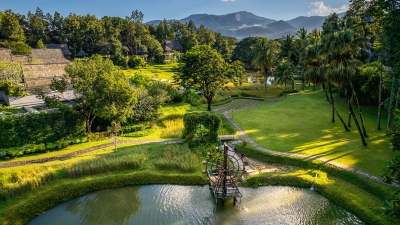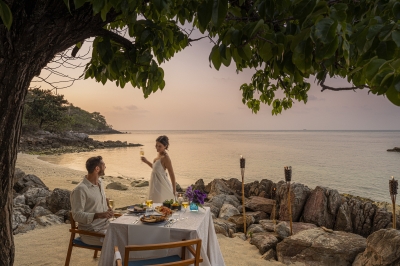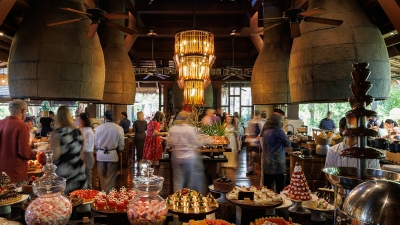A Commitment to Environmental Stewardship: Four Seasons Resort Chiang Mai
The Resort places sustainability at the heart of guest and non-guest facing operations
As a forerunner of sustainability practices in Chiang Mai, Four Seasons Resort Chiang Mai is leading the way with focused initiatives that foster a deep sense of responsibility to the environment. “Sustainability is not just a mantra; we are committed to integrating it into every area of our operations,” says Sean Mosher, General Manager.
Traditional Farming
Rice cultivation has been practiced in the Mae Rim region for generations, continuing the local, sustainable method of farming. “At the Resort, we have incorporated terraced rice paddies within our landscape that is carefully tended to by a team of gardeners and farmers,” shares Anthony Tschudin, Resort Manager. The rice grown at the Resort is a local variant, sown and harvested by hand. By using purely native farming techniques, free of machinery and chemicals, the rice fields within the Resort are environmentally friendly and maintained in their natural state including the quality of the soil. “As part of our rice farming initiative, we conduct an annual rice donation program where the bountiful harvest is shared with the nearby community,” he adds.
Water Management
In a modern world where water is an essential and precious resource, every drop used within the Resort is recycled and reused within the premises. After a rigorous treatment process, the wastewater generated in the Resort is purified to meet the highest environmental standards before being repurposed for garden irrigation. This sustainable approach not only reduces the dependence on local water resources, but also maintains the Resort's verdant landscape in a sustainable way. A dedicated engineering team conducts regular checks to ensure that the water meets local environmental regulations and does not harm the Resort's lush vegetation or the broader ecosystem beyond. This initiative holds a special place for Chief Gardener Pondkaran Kanta, “We take pride in the fact that our wastewater is not discharged but reused to create the wonderful tropical landscape that our guests experience.”
Waste Reduction
One of the major challenges for the hospitality sector has been the management of food waste, which can be quite significant due to the large volumes of food prepared and served daily. The Resort tracks daily production and waste through computer technology to monitor reasons for surplus from catering and buffet lines, providing a detailed analysis on seasonal trends. “This enables us to optimise our kitchen production and reduce waste generation,” says Tschudin.
Finding eco-solutions for kitchen waste, organic composting is done daily in a safe and environmentally sound manner. Vegetable peels, eggshells, and coffee grounds are some of the most common waste materials and they are easily converted into organic fertilizer for the soil. As evidenced from the picturesque gardens and scenery at the Resort, this initiative has been a resounding success.
Biodiversity and Conservation
As an ode to the rich diversity of local flora in and around Ching Mai, the Resort is dedicated to growing a variety of indigenous plants that help in conservation of local species of plants and trees. “Natural beautiful, broad-leafed trees not only look lovely, but they help nurture an eco-system that includes endemic birds, insects, and even small mammals such as squirrels. We encourage our guests to learn more about the local vegetation and bird species on guided nature walks with our expert naturalists,” shares Tschudin.
Sustainable Cuisine
Local fruits and vegetables are best when enjoyed in season, and by sourcing them from local communities, it helps build a lasting bond and create goodwill. Taking the sustainability drive outside the boundaries, the Resort’s culinary team is tasked to source as many ingredients as they can locally, with a focus on seasonality.
“The rural way of life in Thailand is intrinsically sustainable, and by embracing as much of the local traditions as we can at our countryside retreat, we are creating a uniquely Thai experience - one that is truly sustainable and integrated into the local community,” says Mosher.













